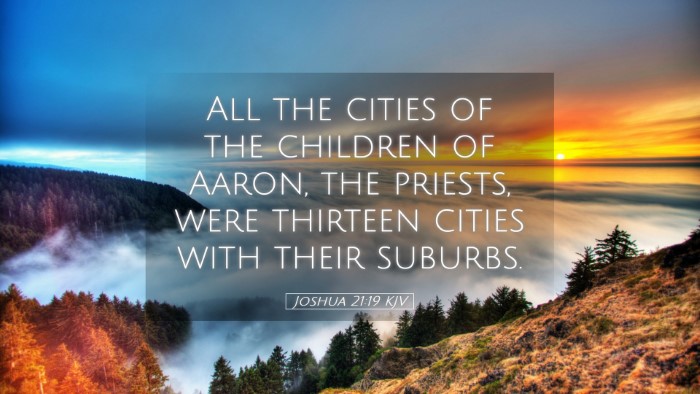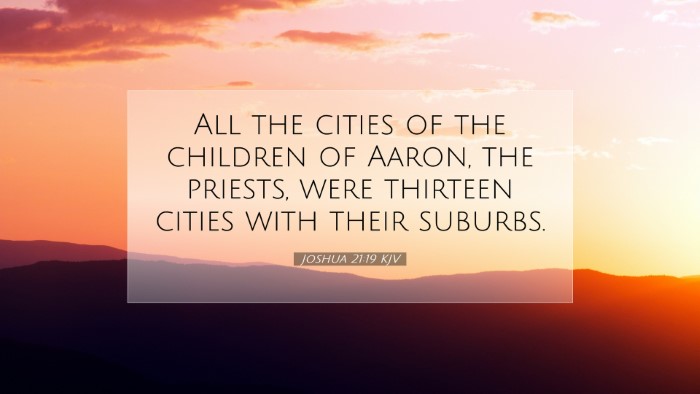Commentary on Joshua 21:19
Joshua 21:19 states, “All the cities of the children of Aaron, the priests, were thirteen cities with their suburbs.” This verse concludes the enumeration of the Levitical cities and emphasizes the provision made by God for the tribe of Levi. In examining this passage, we glean insights from several public domain commentaries such as those by Matthew Henry, Albert Barnes, and Adam Clarke.
Historical Context and Significance
The allocation of cities to the Levites signifies God’s care for the clergy, showing the importance of spiritual leadership within Israel. The Levites were set apart for the service of the Tabernacle and later the Temple. They were ordained for various responsibilities, including priestly duties and maintenance of the worship practices among the Israelites. Therefore, their sustenance and habitation were of utmost importance.
According to Albert Barnes, the distribution of towns among the Levites underscores the necessity of the Levites being situated close to the people, facilitating their critical role as religious leaders and teachers. They acted as mediators between God and the Israelites, implying that accessibility to the priests was important for the spiritual wellbeing of the community.
Number of Cities: Symbolism and Importance
In the verse, "thirteen cities" is specifically noted, and Matthew Henry points out the significance of the number twelve, symbolic of the tribes of Israel, with the inclusion of Levi representing God's special choice. The thirteenth city may symbolize the excess of God's grace towards the priestly class — a divine provision that highlights their distinct role.
- God's Provision: The thirteenth city indicates abundance; the provision for priests and their needs is a demonstration of God’s provision for spiritual leaders.
- Leadership Designation: The fact that Aaron and his sons were given these specific cities shows a divine order in leadership, signifying the importance of structured governance and order within the worship and service of Israel.
Priestly Duties and Their Relevance
The Levites, particularly the descendants of Aaron, carried significant responsibilities as spiritual leaders. Adam Clarke expounds on their duties, which include teaching the Law, conducting sacrifices, and ensuring the sanctity of worship practices. Their roles fostered a deep connection between God and the people, ensuring the transference of spiritual knowledge from generation to generation.
Teaching and Instruction
With designated cities, the Levites had the opportunity to effectively instruct the Israelites in God’s commandments. This resonates with contemporary pastoral responsibilities, reminding today’s leaders of the importance of teaching and pastoral care.
Suburbs and Provision for the Levites
The mention of “suburbs” in the verse highlights that the cities allotted to the priests were not merely urban centers but included surrounding land adequate for their needs. As Henry elaborates, this demonstrates God’s foresight in ensuring that they could both live and maintain their duties without distraction or lack.
Implications for Modern Leaders
For today’s pastors, this aspect inspires an examination of their own resources and how they are supported in ministry. The physical needs of spiritual leaders are crucial for their effectiveness in the spiritual realm.
Conclusion and Application
Joshua 21:19 presents a rich tapestry of meaning regarding the role of the Levites and their provision by God. As pastors, theologians, and students of the Word, one can appreciate that this distribution among the Levites is not just a mere historical account; rather, it reflects God’s enduring commitment to provide for spiritual leaders and underscores the sanctity of their work.
As we meditate on this verse, may we be reminded of the call to honor our spiritual leaders, ensuring that they have the resources necessary to flourish in their God-given roles. This ultimately contributes to the health of the church and the fostering of a community that seeks to know and serve God wholeheartedly.


